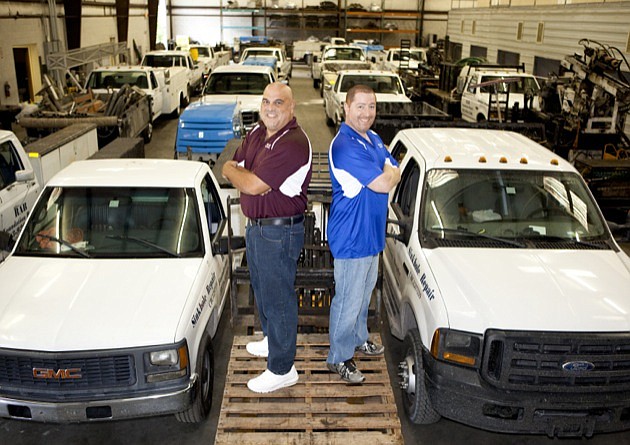- November 26, 2024
-
-
Loading

Loading

Mike Manley and Rodger Bennett don't look like financial clairvoyants. But their knack for sensing economic disaster — and navigating around it — has turned out to be uncanny.
The pair started RAB Foundation Repair LLC, a sinkhole repair company headquartered in Odessa, just when the housing crisis began to decimate the construction sector. Despite the unfortunate economic conditions and new insurance legislation threatening to sink their business, RAB has found a way to rise above it. It has added at least $1 million to annual revenues each year since it began in 2007 and has grown to 52 employees.
Seeing the first signs of the decline of the housing market, Manley, president of RAB, knew he was in trouble. He was then the owner of a mortgage brokerage. “I started to sense something was coming,” he says, “and then the calls stopped coming in.”
The timing was perfect, for Bennett, his longtime friend, was preparing to branch out on his own. Bennett, RAB's vice president, worked on sinkhole repairs before and saw a void in the market. He approached Manley, and the pair decided to go into business together. “It took us a 30-second conversation to decide,” says Bennett, “he trusts me with his family's future, and I trust him with mine.”
The idea was a gamble, considering the state of the housing sector. “We weren't worried,” says Bennett about the depressed construction industry. “We knew there were contracts out there.”
In early 2007, the two friends plunked down $42,000 for the lease on a building and four run-down trucks. “We were just praying they would make it to the jobs,” Bennett says with a chuckle.
For the first few months, business was slow. Sinkhole repair involves an absurd amount of regulation, and companies involved must follow protocol meticulously. Insurance companies, independent geotechnical engineers and construction companies, like RAB, are all entwined, says Bennett. Engineers identify a sinkhole and the propery owner's insurance company picks the repair company. “They didn't want to work with someone new,” he says, “so we knew that we had to prove ourselves with the first contract.”
To get that first contract, Bennett and Manley's pitch included superior customer service and efficiency to get jobs completed quickly.
The company earned $4.3 million in revenues in 2008 — up from $900,000 the previous year — revealing that it had muscled its way into the sinkhole-repair society. Revenues were up 50% in 2009.
Manley and Bennett attribute the firm's success to its determination to stay out of debt — even in a capital-intensive industry. “We spent months without accepting paychecks so we could buy our equipment,” says Bennett. “We wanted to keep our heads above the pillow.” The company owns 90% of its machinery free and clear.
And customer service policies as simple as having a live operator to answer calls and learning the names of every client the company services set RAB apart from the competition, says Julia Rettig, a former commercial real estate agent with 20 years of experience.
The addition of Rettig is another example of the foresight shown by Manley and Bennett. Citing large increases in sinkhole claims and sinkhole fraud, Citizen's Property Insurance recently started lobbying to increase rates by more than what the Florida Office of Insurance Regulation mandates. Rettig explains that higher rates may reduce RAB's residential contracts, which constitute 90% of the company's business.
In an effort to diversify, RAB hired Rettig, who has moved more than 1 million square feet of commercial property, to gain commercial clients — which currently make up about 10% of the company's business. The company implemented this strategy in 2010, months before Citizen's Property Insurance began lobbying for higher rates on sinkhole insurance.
The shift in focus from residential to commercial clients has so far worked, with RAB on track to hit $11 million in revenues this year, a 33% increase compared to 2010.
“We didn't want to pursue that until we could handle it,” Bennett says of the commercial sector. “Now we know we can handle it.”